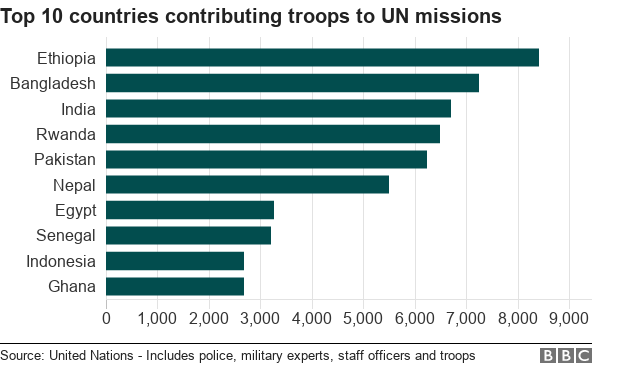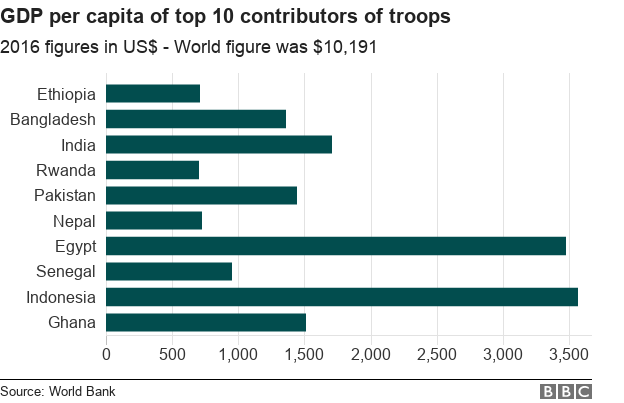How Much Does A UN Soldier Cost?
This article looks at the costs behind countries contributing troops to UN peacekeeping missions.
Download or read the article below, or read the original by the BBC here.
_________________________________________________
The claim: Countries contributing troops to UN peacekeeping missions are well paid for sending their personnel.
Reality Check verdict: Countries are paid to provide personnel to UN missions and the top countries providing troops are unrepresentatively poor. The amount countries are paid for providing those troops is considerably higher than the average wage in most of the countries sending large numbers of troops.
Madeleine Rees, secretary general of the Women's International League for Peace and Freedom, told BBC Radio 4's Today programme that countries providing UN peacekeeping forces could be made to accept a tighter legal framework and prosecutions for misconduct.
"Troop contributing countries get an awful lot of money from the UN for sending troops - they don't want to not send troops," she said.
Countries sending troops (including police and military experts) are paid $1,410 (£1,017) per month per soldier by the UN, which is considerably higher than the average wage in many countries.

The top contributors of troops tend to be poorer countries.
The chart below has the GDP per capita for the top 10 contributors of troops - that's the total amount of goods and services produced in the economy divided by the population.
The GDP figure for the world in 2016 was $10,191 - all of the countries on the list are considerably below this level.
Indeed, according to the data from the World Bank, Rwanda, Ethiopia and Nepal are the 19th, 20th and 21st lowest in terms of GDP per capita among the 191 countries for which figures were available.
Indonesia, the richest country on the list by this measure, was 71st lowest.

The exception to the rule that poorer countries tend to provide the most troops is China - which is number 12 on the list of troop contributor countries - and is also in the top three financial contributors to the UN budget.
Of the other biggest contributors to the budget, the United States is number 73 on the list of troop contributors with 48 people deployed, while Japan is close to the bottom of the list with two people deployed.
The UK is the sixth biggest cash contributor and number 35 on the troop list, with 625 troops deployed.
Clearly, it makes sense for countries such as Ethiopia and Egypt to be well-represented among UN peacekeeping forces given the number of peacekeeping operations near them in places such as South Sudan and Darfur.
It is still remarkable to see Rwanda, with a population of only about 12 million, as the fourth biggest contributor of peacekeepers - 55 people per 100,000 in Rwanda serve as UN peacekeepers.
What are average monthly wages?
Does that mean the countries are well paid?
Remember that the countries are paid by the UN and then pay troops based on their own pay scales.
The latest Labour Force Survey in Ethiopia carried out in 2013, for example, put the average monthly wage at 1,305 Birr a month, which now translates to $47.
In Ghana in the same year it was 627 Cedi, which now translates at $141. In Bangladesh in 2016 it was 12,915 Taka or $155. In Pakistan, it was 14,921 Rupee or $134.
In all of those countries, $1,330 a month looks generous.
For a country like the UK, though, where average monthly earnings are £2,383 ($3,304) it looks less generous.
